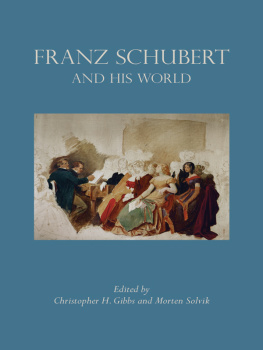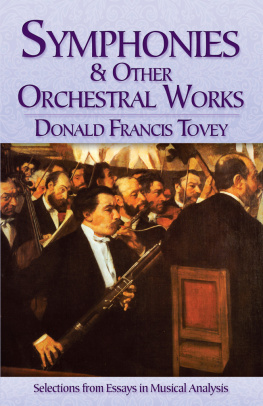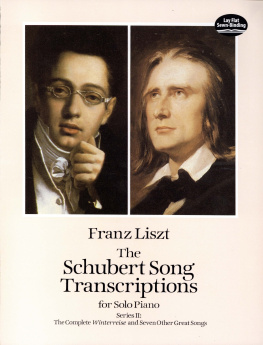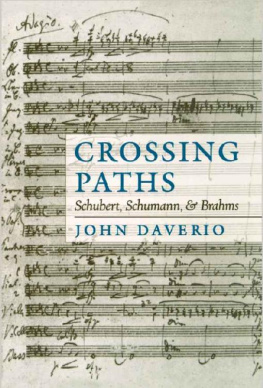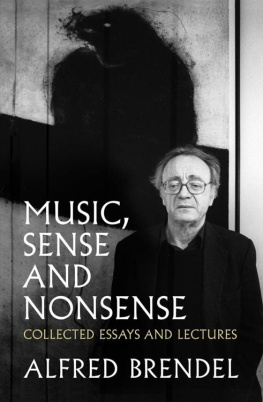
FRANZ SCHUBERT AND HIS WORLD
OTHER PRINCETON UNIVERSITY PRESS VOLUMES PUBLISHED IN CONJUNCTION WITH THE BARD MUSIC FESTIVAL
Brahms and His World
edited by Walter Frisch (1990)
Mendelssohn and His World
edited by R. Larry Todd (1991)
Richard Strauss and His World
edited by Bryan Gilliam (1992)
Dvok and His World
edited by Michael Beckerman (1993)
Schumann and His World
edited by R. Larry Todd (1994)
Bartk and His World
edited by Peter Laki (1995)
Charles Ives and His World
edited by J. Peter Burkholder (1996)
Haydn and His World
edited by Elaine R. Sisman (1997)
Tchaikovsky and His World
edited by Leslie Kearney (1998)
Schoenberg and His World
edited by Walter Frisch (1999)
Beethoven and His World
edited by Scott Burnham and Michael P. Steinberg (2000)
Debussy and His World
edited by Jane F. Fulcher (2001)
Mahler and His World
edited by Karen Painter (2002)
Janek and His World
edited by Michael Beckerman (2003)
Shostakovich and His World
edited by Laurel E. Fay (2004)
Aaron Copland and His World
edited by Carol J. Oja and Judith Tick (2005)
Franz Liszt and His World
edited by Christopher H. Gibbs and Dana Gooley (2006)
Edward Elgar and His World
edited by Byron Adams (2007)
Prokofiev and His World
edited by Simon Morrison (2008)
Brahms and His World (revised edition)
edited by Walter Frisch and Kevin C. Karnes (2009)
Richard Wagner and His World
edited by Thomas S. Grey (2009)
Alban Berg and His World
edited by Christopher Hailey (2010)
Jean Sibelius and His World
edited by Daniel M. Grimley (2011)
Camille Saint-Sans and His World
edited by Jann Pasler (2012)
Stravinsky and His World
edited by Tamara Levitz (2013)
FRANZ SCHUBERT AND HIS WORLD
EDITED BY CHRISTOPHER H. GIBBS AND MORTEN SOLVIK
PRINCETON UNIVERSITY PRESS
PRINCETON AND OXFORD
Copyright 2014 by Princeton University Press
Published by Princeton University Press, 41 William Street,
Princeton, New Jersey 08540
In the United Kingdom: Princeton University Press,
6 Oxford Street, Woodstock, Oxfordshire OX20 1TW
press.princeton.edu
All Rights Reserved
For permission information, see page xvii
Library of Congress Control Number: 2014940720
ISBN: 978-0-691-16379-6 (cloth)
ISBN: 978-0-691-16380-2 (paperback)
British Library Cataloging-in-Publication Data is available
This publication has been produced by the Bard College Publications Office:
Ginger Shore, Project Director
Karen Walker Spencer, Designer
Anita van de Ven, Cover Design
Text edited by Paul De Angelis and Erin Clermont
Music typeset by Don Giller
This publication has been underwritten in part by grants from Roger and Helen Alcaly and Furthermore, a program of the J. M. Kaplan Fund
Printed on acid-free paper.
Printed in the United States of America.
1 3 5 7 9 10 8 6 4 2
Preface
Dein Freund Schubert. These were probably the last words the composer ever wrote, about a week before he died on 19 November 1828, at age thirty-one. They were the conclusion to a heart-wrenching letter to Franz von Schober, his closest friend, that began: I am ill. I have eaten nothing for eleven days and drunk nothing. And I totter feebly and shakily from my chair to bed and back again. He then made the simple request that Schober send him some novels by James Fenimore Cooper.
Schuberts last letter points to some defining dimensions of his all-too-brief life: that friends and family were at its center (he was living at the time with his older brother Ferdinand, having recently moved from Schobers place); that literature was a consuming passion; and that serious illness led to early death. An obituary a few weeks later observed that the composer lived solely for art and for a small circle of friends. To this constellation of friendship, art, and a life of seemingly endless potential cut short, we should add another crucial element: Vienna. Unlike great predecessors who moved to the gloried city of music, Schubert was born and remained there, with only infrequent excursions not far away.
An understanding of the music Schubert wrote during his brief career benefits enormously from awareness of the social, cultural, intellectual, and political context in which he lived and worked. This book, the twenty-fifth in the Bard Music Festival series published by Princeton University Press, aims more than ever to be true its title: to explore a particular composers world, a world that in Schuberts case proved quite limited in duration, geography, and professional opportunities, but that nonetheless nourished astounding creative achievements, not only from contemporaries in music, such as Beethoven, but in the other arts as well.
One of the many enduring myths about Schubert is that he was largely unrecognized during his lifetime, a sad situation allegedly allayed to some extent by a devoted circle of friends who embraced his music. The reality seems to have been much more complex. He enjoyed considerable success, both in Vienna and beyond, with his songs and small-scale pieces, most intended for domestic consumption. A culture of intimate music-making is epitomized by the Schubertiades of the 1820s, evenings devoted to his music at which Schubert and others played for friends and invited guests. Schuberts ambitions, however, went much farther, extending to what he once described to a publisher as his strivings
The idea of an unfinished career finds expression in Schuberts most popular instrumental work, his Symphony in B Minorthe Unfinishedcomposed in 1822, and actually just one of a handful of his unfinished symphonies. When the work was finally premiered more than forty years later, in December 1865, critic Eduard Hanslick noted the excited extraordinary enthusiasm of the audience and how after hearing only a few measures every child recognized the composer, and a muffled Schubert was whispered in the audience every heart rejoiced, as if, after a long separation, the composer himself were among us in person. The unfinished state of both the symphony and painting helps remind us of Schuberts unfinished life, suggesting a figurative program to various pieces that have none declared, not just the Unfinished Symphony, but also the Quartettsatz, Reliquie Piano Sonata, and other marvelous torsos.
The span of Schuberts active public career lasted less than fifteen years, from 1814 to 1828. It is fitting that this book should appear in 2014, and that the Bard Music Festival honors Schubert during its twenty-fifth season, as the year marks the bicentennial of his miraculous masterpiece Gretchen am Spinnrade, whose composition on 19 October 1814 is often hailed as the Birthday of the German Lied. In political history, the year also had profound consequences for Schubert and his contemporaries, as it saw the convening of the Congress of Vienna, held between September 1814 and June 1815 to negotiate borders and balances of power in the wake of the Napoleonic Wars. A period of reaction in Austria under the powerful Prince Clemens von Metternich led to censorship and repression that crucially defined aspects of Schuberts world.
A better appreciation of this time and place reveals matters that contemporaries, especially close friends, would have understood but that have since been obscured or forgotten. Despite the focus of much recent Schubert scholarship on ahistorical analytic matters, there have nonetheless been enormous strides in advancing archival and documentary knowledge of Schuberts world, all building on the pioneering work of the great Schubert scholar Otto Erich Deutsch (18831967). The publications of the Internationales Franz Schubert Institut between 1987 and 2005, the journal
Next page
